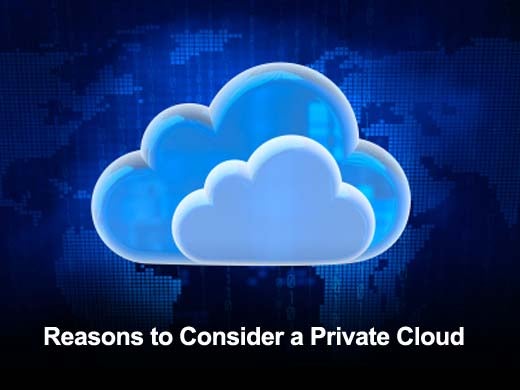Public cloud evangelists trumpet the flexibility, scalability and cost-efficiency benefits of platform as a service (a.k.a. PaaS). Some take it a step further, decrying and "FUDing" the private cloud alternative. But critics of private cloud — often evangelizing for the sake of their own self-interest — choose to ignore the advantages of a private cloud approach.
The truth: Private cloud represents a better solution for the real-world enterprise. The real-world enterprise demands security, flexibility and control, and the private cloud delivers. There are many reasons to “go private.” Bart Copeland, CEO of ActiveState has identified the top 10.
Click through for 10 reasons to consider a private cloud, as identified by Bart Copeland, CEO of ActiveState.
Your data is in the public cloud. It must be safe, right? Yes. Absolutely. Probably. Mostly. Pretty sure. What was the question again?
Security is about control, and public cloud providers demand a simple leap of faith from their customers: “Trust us with your data. It’ll be fine.” And most of the time, your data will be safe. It’s those few times it’s not that are the problem.
The private cloud model puts security in the hands of data owners, and the real-world enterprise demands that level of control.
It’s 10 p.m. Do you know where your public cloud data is? It’s on a server, maybe in Hong Kong, the Cayman Islands or perhaps South Dakota. Not something you have to worry about, right?
Sure, unless you have operations in a foreign country. Many European nations, for instance, demand that cloud-hosting providers retain data in and serve data from servers located within a national boundary. Strict data-sovereignty laws limit many public cloud services’ ability to deliver across geographies.
Private cloud solutions enable the real-world enterprise to position its own cloud to support its international business objectives. Need to support your regional office in Prague? Start with a local private cloud. It’ll be a lot easier than convincing your public cloud hosting provider to set up a new data center in the Czech Republic.
Your real-world enterprise runs on your applications. And your skilled development team has built those apps, using the language that best serves the development need: Java, Ruby, Perl, Python, Node.JS, you name it.
Here’s the hard truth: Not every public cloud supports every language. With private cloud, the real-world enterprise owns the cloud and owns the decision of which language(s) to support. With the right technology, multilingual cloud app support becomes a reality.
The public cloud is an open book. Your cloud-hosting provider’s architecture is fundamentally rigid, explicitly documented and utterly standardized. And that’s great for complying with government operations guidelines.
Until it’s not. No public cloud model is flexible enough to accommodate the moving myriad of government regulatory red tape around the world, let alone in one region (say, Europe). Private cloud architectures empower the real-world enterprise to control compliance at any level, be it national, provincial, or municipal.
You own your data. Where/how you store it in the public cloud doesn’t change that. When you’re floating in a public cloud, there are no absolutes. Your data is your own, as long as a regional government overseeing the geography in which a data center resides agrees. But that wouldn’t happen in a first-world country, right?
Public cloud hosting providers cannot guarantee Big Brother won’t look over your shoulder — for reasons that have nothing to do with you. Last year, Microsoft UK — citing the U.S. Patriot Act — admitted it could not prevent government entities from obtaining cloud-hosted customer data, even without those customers’ permission.
The private cloud approach skirts this gray area. When the real-world enterprise owns the cloud, government oversight is at the level of the corporation, not the data. And that means no one will look over your shoulder, at least without a warrant.
Going to the cloud can introduce new process efficiencies, reduce application deployment time and lighten IT overhead loads. It’s an idealized vision, as long as your apps fit in your public cloud-hosting provider’s mold.
Are all of your applications designed for the cloud? Got any custom-designed legacy applications? Here’s hoping they work with your public cloud. Otherwise, you might have to recode them from scratch to work within a rigid public cloud architecture.
Real-world enterprises must deploy both existing and new applications to the cloud, and that requires complex application management. The private cloud model can support a flexible mix of on-premise, hybrid and cloud applications.
The public cloud model offers an attractive escape from the overhead of provisioning, monitoring and administration. But the very nature of the public cloud imposes a lowest-common denominator approach: You get what you pay for, and that means the same (exact) setup as the shared multitenant neighbor next door. Sounds good, in a cookie-cutter sort of way. And as long as you’re not a round peg trying to fit into your cloud-hosting provider’s square holes.
In the real world, enterprise pegs are round, and triangular, and octagonal. The real-world enterprise’s business objectives are its own, and its cloud solutions are shaped to support the enterprise’s goals, rather than the other way around. The private cloud model delivers that level of flexibility.
The public cloud is great, if you’re a small business, with small business needs. You don’t have to worry about managing your IT; the public cloud does it for you. Perhaps you work in civic government—the public cloud is perfect for you, particularly if you can share data services with the town next door.
But if you’re a real-world enterprise, your basic business objectives could be hindered by the limitations of a one-size-fits-all public cloud. And you need a cloud solution that’s designed specifically for you (and not for everyone else too).
The public cloud is great, just sign up, send over your apps and start benefitting from all those advertised cost efficiencies. If only it were that simple. Tested your apps yet? More likely than not and they’ll require customization to work in the public cloud. Be sure to budget for those app-migration costs. And what about your own servers? If your public cloud can’t connect to your preferred flavor of database, you’ll have to pay to convert your data from one db format to another.
In principle, a private cloud setup won’t necessarily erase data-migration expense. But it can support more-flexible hybrid architectures, preserving access to legacy applications and enabling cloud application deployment without the sacrifice of extensive recoding and the real-world enterprise demands that cloud deployment flexibility.
Public cloud architectures can deliver shared-resource efficiencies, utility computing and flexible scalability. Those benefits are seductive, but at times illusory. With the right technology, private clouds deliver on those promises; yet provide better security, better control and greater flexibility than public cloud alternatives. That’s what the real-world enterprise truly deserves.













